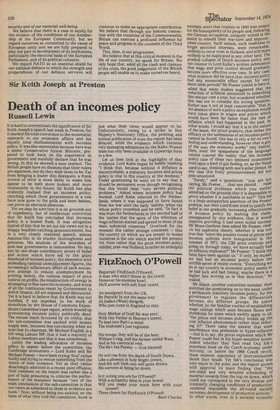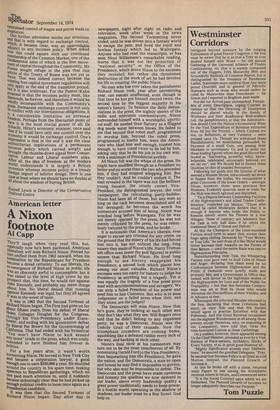Sir Keith Joseph at Preston
Death of an incomes policy
Russell Lewis
It is hard to overestimate the significance of Sir Keith Joseph's speech last week in Preston, for it marked his total conversion to the monetarist approach to our economic affairs and his equally total disillusionment with incomes policy. It was also memorable because here was a senior Conservative former Minister, prepared to look back on his experience in government and manfully declare that he was wrong. In this he showed a sure instinct. The British people have no illusions that their rulers are supermen, nor do they wish them to be. Far from bringing a leader into disrepute, a frank avowal of error is more likely to make him appear to be both more human and more trustworthy in the future. Sir Keith has also evidently realised that an incomes policy, clutching which three governments in a row have now gone to the polls and been beaten, can prove an electoral albatross.
Yet we may be sure that it is on grounds not of expediency, but of intellectual conviction that Sir Keith has concluded that incomes policy is a busted flush. It was altogether typical of him that he set out his views not in a snappy headline-catching pronouncement, but in a very closely reasoned speech, almost Aquinas-like in its erudite thoroughness and precision. His analysis of the mistakes of post-war governments is remorseless. He lists one by one those contributory errors of belief and action which have led to the giant falsehood of incomes policy; the obsession with misleading national unemployment figures, the increasingly inflationary effect of each successive attempt to reduce unemployment by printing money, the ruinous impact of price control on profits, the misdirection of energy in attempting to fine tune the economy, and worst of all the continuous resort by Government to deficit finance. All are exposed and denounced. Yet it is hard to believe that Sir Keith was not fortified, if not impelled, to his work of demolition by the House of Commons Expenditure Committee's last report, which wound up pronouncing incomes policy politically dead. The excuse much favoured by its critics, that the sub-committee was packed with money supply men, becomes less convincing when we note that its chairman, Mr Michael English, is a left-wing Labour MP, that it had a majority of Labour members and that it was unanimous.
Lately the leading advocates of incomes pdlicy to appear before the committee, the Cambridge economists — Lord Kahn and Mr Michael Posner — have been crying 'foul' rather loudly and trying to rescue something from the wreck of their evidence. Yet as they rather disarmingly admitted in a recent joint effusion, their comment on the report was rather like a pair of bulls presuming to criticise the perfor mance of the matadors because "one of the main conclusions of the sub-committee is that our views as submitted to them in evidence are bunk." Now, without being too unkind, on the basis of what they told the committee, bunk is just what their views -would appear to be. Unfortunately, owing to a strike in Her Majesty's Stationery Office, the printing and normal publication of even the report has been delayed, while the evidence which contains very damaging admissions by the Kahn/Posner team has only been available in typescript form to a few.
Let us then look at the highlights. of that evidence. Lord Kahn began by baldly insisting "I think that, because without it inflation is uncontrollable, a statutory incomes and prices policy is vital to this country at the moment." Under questioning he went on to say that it should be permanent even though recognising that this would raise "very severe political problems." Asked where incomes policy had worked, Lord Kahn referred to the Netherlands, where it was supposed to have lasted from the war until the early 'sixties, when the whole policy crumbled and he said, "In fact it was from the Netherlands in the second half of the 'sixties that the spirit of the infection of wage inflation started and spread to most of the main industrial countries." Overlook for the moment this rather strange comment — that the country on which we are meant to model ourselves is the one which started the present rot. Note rather that the prize incomes policy exhibit, post-war Holland, is rather an unhelpful
a
example, since that country in 1945 was unique for the homogeneity of its people nd, following the German occupation, uniquely united in the desire to rebuild their war-torn and impoverished country. Such unison, such readiness to forget sectional interests, were remarkable, unlikely to recur even in Holland, and still more unlikely to be duplicated in any other land. The gradual collapse of Dutch incomes policy. also ran counter to Lord Kahn's written submission that wage and price control should graduallY become more effective over time. In any case, what evidence did he have that incomes policy had any measurable effect except for verY short-term periods? Mr Posner joined in here to admit that many studies suggested that the reduction a inflation amounted to something like one per cent a year, but wondered whether this was not to consider the wrong question Rather was it not at least conceivable "that in the absence of such a policy an explosion would have taken place in wages and prices which would have been far faster than the rate of inflation which had happened in the past. In other words, I would say that it is in the nature of the beast, the proof positive, that either the efficacy or the uselessness of an incomes policy cannot be found. One has to rely a bit on ,one s feeling and understanding, however that tsgot, of the way the economy works" (my italics). Here, even the opaqueness of the language cannot conceal the reality that the incomes policy case of these two eminent economists rests upon a kind of gut feeling, or, as the Nazis used to say, thinking with one's solar plexus. In any case this fruity pronouncement did not pass unnoticed.
"Surely," said a questioner, "you are riot saying, Mr Posner,. ..that one should ... raise the political problems which you earlier admitted on the grounds that it is impossible to prove whether it is justifiable or not?" This led to a fresh unsupported assertion of the Posner position, but then Lord Kahn tried to justify has
belief in the gradually increasing effectiveness of incomes policy by making the claim' unsupported by any evidence, that it would improve providing it had some initial success. Mr Bruce-Gardyne then asked Mr Posner, vts-dvis his explosion theory, whether it was not true that "since the present round of prices and incomes policies were inaugurated in the summer of 1971, the CBI price controls and going on through today, we have actually had an inflation explosion?" Mr Posner: "I think the fates have been against us." If only, he mused, we .had had an incomes policy before the terrible series of recent events. "Everything we do incountry in economic policy seems to be bad luck and bad timing; maybe there is a higher fate moving us in that direction," he wailed. Mr Alison, another committee member, then switched the questioning on to the need, under a permanent statutory incomes policy, for the government to regulate the differentials between the different groups. He asked whether, by the familiar routine of establishing wage ceilings which soon became floors and thresholds for some which swiftly apply to all, "the prices and incomes policy stokes up the cost inflation phenomenon rather than reducing it?" There came the answer that state interference was preferable to hyper-inflatibn — that is to say, the prices explosion which Mr Posner could feel in his hyper-sensitive bones. Asked whether they had read Ota Sik's important book on the Czech economy under Novotny, i.e. before the 1968 Czech revolt, these eminent exponents of interventionism shook their heads. Yet Sik's conclusion was very much to the point and the report quotes with approval its main finding that "the one-sided and very detailed scheduling of material rewards from the top on down, which could not correspond to the very diverse and constantly changing conditions of production, rendered impossible the all-round socially necessary development of productive activity." In other words, even in a socialist economy centralised control of wages and prices leads to stagnation. One further admission merits our attention anj. that is with regard to exchange control, Which, it became clear, was an unavoidable adjunct to any incomes policy. When asked how this could square with our continued puembership of the Common Market, one of the ndarnental aims of which is the free movement of capital throughout the Community, Mr Posner sought refuge in the plea that this article of the Treaty of Rome was not yet in f°r.ce. That was indeed correct because the existing free capital movement regulations will ?rdY. apply at the end of the transition period; out it is also irrelevant. For the Posner/Kahn Proposal is that the incomes policy must, like diamonds, be forever, and therefore it would be Wholly incompatible with the Community's goals. Permanent exchange control is not only .In conflict with our international obligations, it Ls a considerable limitation on personal Lreedom. Perhaps from the libertarian point of View it is the most crucial power of all. Dr .1cbacht, Hitler's economic minister, once said that if he could have only one control over the economy it would be exchange control. One's unPression is that in the end it was the clear authoritarian implications of a permanent incomes policy which carried weight and brought the thumbs-down signal from Conservative, Labour and Liberal members alike. After all, the idea of freedom as the modern World understands it is largely a British Invention whereas incomes policy is a trendy foreign import of inferior design. Here is one case at least where we should have no doubts at all about the wisdom of buying British.
Russell Lewis is Political Centre Director of the Conservative



































































 Previous page
Previous page